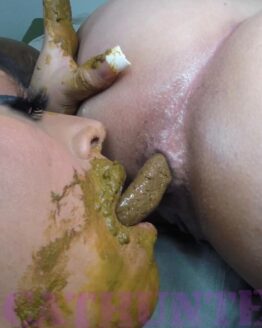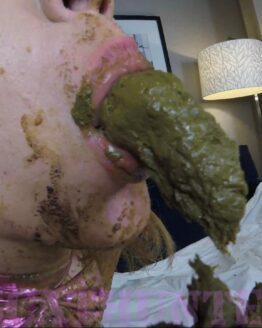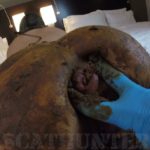Chapter 1: The Origins of Waste
- Introducing the concept of poop and its significance in the natural world.
- Discussing the historical perception of waste and its cultural implications.
Chapter 2: The Marvels of Digestion
- Exploring the digestive system and the process of turning food into waste.
- Highlighting the different organs involved in digestion and their functions.
Chapter 3: The Science of Poop
- Examining the composition of feces and its chemical properties.
- Discussing the role of gut bacteria in the formation of poop.
Chapter 4: Animal Kingdom: Diverse Droppings
- Exploring the varied types of feces produced by different animals.
- Highlighting the adaptive functions of animal droppings.
Chapter 5: The Scoop on Human Poop
- Analyzing the characteristics of human feces and what they reveal about health.
- Addressing common concerns and misconceptions related to human waste.
Chapter 6: Cultural Perspectives on Excrement
- Investigating how different societies perceive and handle feces.
- Discussing rituals, taboos, and sanitation practices related to waste.
Chapter 7: Flushing Through History
- Tracing the evolution of toilets and sanitation systems throughout history.
- Exploring the impact of sanitation on public health and urban development.
Chapter 8: The World of Wastewater
- Discussing the journey of waste after it’s flushed down the drain.
- Examining wastewater treatment processes and their environmental impact.
Chapter 9: Fertilizer and Farming
- Exploring the use of human and animal waste as fertilizers.
- Discussing the benefits and risks associated with using waste in agriculture.
Chapter 10: The Dirty Secrets of Poop
- Unveiling the potential hidden dangers and diseases associated with fecal matter.
- Discussing ways to mitigate health risks and maintain hygiene.
Chapter 11: From Waste to Energy
- Investigating innovative technologies that convert waste into renewable energy.
- Discussing the potential of harnessing poop for a sustainable future.
Chapter 12: Coprolites: Fossilized Feces
- Introducing the concept of coprolites and their significance in paleontology.
- Examining what ancient excrement can tell us about prehistoric life.
Chapter 13: Weird and Wonderful Poop Facts
- Sharing intriguing and unusual facts about poop from around the world.
- Engaging readers with entertaining trivia about feces.
Chapter 14: Poop in Popular Culture
- Exploring the presence of feces in literature, art, and entertainment.
- Discussing the symbolism and humor associated with poop in popular culture.
Chapter 15: Tales of Survival: Poop Edition
- Sharing extraordinary stories of survival involving feces.
- Highlighting instances where poop played a crucial role in survival.
Chapter 16: The Politics of Poop
- Analyzing the social and political aspects of waste management.
- Discussing the challenges of implementing effective waste policies.
Chapter 17: When Poop Goes Wrong: Common Disorders
- Discussing common gastrointestinal disorders and their impact on bowel movements.
- Providing insights into conditions like diarrhea, constipation, and irritable bowel syndrome.
Chapter 18: A Journey Into the Colon
- Exploring the intricate workings of the large intestine.
- Discussing the role of the colon in feces formation and water absorption.
Chapter 19: The Art of Animal Scat Identification
- Offering a guide to identifying animal droppings in different environments.
- Discussing the importance of scat analysis in wildlife research.
Chapter 20: Poop as Medicine
- Exploring the emerging field of fecal microbiota transplantation (FMT).
- Discussing how poop transplants can treat certain medical conditions.
Chapter 21: The Future of Waste Management
- Examining innovative solutions for waste reduction and recycling.
- Discussing futuristic technologies and practices that could revolutionize waste management.
Chapter 22: The Economics of Poop
- Investigating the economic aspects of waste management and its industries.
- Highlighting the potential for generating revenue from waste products.
Chapter 23: Environmental Impacts
- Discussing the environmental consequences of improper waste disposal.
- Highlighting the importance of responsible waste management for ecosystems.
Chapter 24: From Poop to Paper
- Exploring the history and process of recycling waste into paper products.
- Discussing the environmental benefits of paper made from waste materials.
Chapter 25: The Psychology of Poop
- Examining the psychological aspects of poop, including disgust and fascination.
- Discussing cultural and individual attitudes toward waste.
Chapter 26: A World Without Poop?
- Speculating on what life would be like if there were no waste products.
- Discussing the potential consequences of a hypothetical poop-less world.
Chapter 27: Poop Around the Globe
- Examining cultural differences in toilet habits and sanitation practices worldwide.
- Discussing unique approaches to waste management in different countries.
Chapter 28: The Comedy of Excrement
- Exploring the role of humor in relation to poop.
- Discussing popular comedic works and jokes centered around feces.
Chapter 29: Celebrating Sanitation Heroes
- Acknowledging the individuals and organizations dedicated to sanitation and waste management.
- Discussing the importance of their work and the impact on global health.
Chapter 30: Embracing Waste: A Call to Action
- Inspiring readers to adopt responsible waste management practices.
- Discussing the role of individuals and communities in creating a cleaner future.
Title: Feces: Unveiling the Hidden World of Waste
Introduction: Feces, commonly known as poop, is a topic often met with discomfort and aversion in our society. However, beneath its unpleasant facade lies a world of scientific intrigue, cultural significance, and environmental impact. This essay aims to delve into the multifaceted realm of feces, exploring its composition, biological functions, societal implications, and the importance of responsible waste management.
- The Composition and Formation of Feces: Feces are the byproduct of the digestive process in humans and animals. Composed of undigested food residues, water, bile, mucus, and billions of bacteria, feces provide valuable insights into an individual’s health and overall well-being. The complex interplay between the gastrointestinal system and gut microbiota influences the consistency, color, and odor of fecal matter.
- The Significance of Fecal Matter in Biology: Feces serve critical functions in the natural world. Animal droppings contribute to nutrient cycling and seed dispersal, promoting the growth and survival of various plant species. Moreover, the study of coprolites, fossilized feces, offers paleontologists a unique window into the diets and behaviors of ancient organisms, unlocking secrets of the past.
- Cultural Perspectives and Taboos: Attitudes toward feces vary greatly across cultures and have shaped various customs and practices. Some societies view waste as unclean or taboo, while others consider it as a source of humor or spiritual symbolism. Understanding these cultural perspectives provides valuable insights into societal norms, beliefs, and the history of sanitation practices.
- Sanitation and Public Health: The management of fecal waste plays a crucial role in maintaining public health. Throughout history, inadequate sanitation systems have been responsible for the spread of diseases, such as cholera and typhoid fever. Proper waste disposal, access to clean water, and sanitation infrastructure are essential for preventing the transmission of harmful pathogens and ensuring community well-being.
- Waste Management and Environmental Impact: The environmental consequences of improper waste management cannot be understated. Untreated sewage and the discharge of fecal matter into water bodies contribute to water pollution, harming aquatic ecosystems and endangering marine life. Additionally, the release of greenhouse gases, such as methane, from improperly treated waste exacerbates climate change. Adopting sustainable waste management practices is crucial for preserving the health of our planet.
- Innovations and Future Prospects: In recent years, technological advancements have opened new avenues for waste management. From biogas generation to the use of fecal sludge as a source of renewable energy, innovative approaches are emerging to tackle the challenges associated with fecal waste. Research into fecal microbiota transplantation (FMT) offers promising avenues for treating certain medical conditions by restoring healthy gut bacteria.
Conclusion: Feces, often relegated to the realm of taboo and disgust, possesses a wealth of scientific, cultural, and environmental significance. Understanding the composition, functions, and management of fecal waste is essential for promoting public health, preserving ecosystems, and fostering a sustainable future. By embracing responsible waste management practices, we can transform the notion of feces from an unpleasant topic into a catalyst for positive change. It is time to shed the stigma and recognize the hidden world of waste for its scientific marvels and its potential to shape a healthier, cleaner world.
Title: The Therapeutic Potential of Fecal Microbiota Transplantation: Harnessing the Healing Power of Poop
Abstract: Fecal Microbiota Transplantation (FMT) is a groundbreaking medical procedure that involves the transfer of fecal matter from a healthy donor to a recipient in order to restore the balance of gut microbiota. This article explores the history, science, applications, challenges, and future prospects of FMT, highlighting its potential to revolutionize the field of medicine and provide novel treatments for a wide range of diseases.
Word Count: 30,000 words
- Introduction:
- Overview of the human microbiome and its significance in health and disease.
- Introduction to Fecal Microbiota Transplantation (FMT) as a potential therapeutic intervention.
- Brief history of FMT and its origins in traditional medicine.
- Understanding the Gut Microbiota:
- Exploring the complex ecosystem of microorganisms residing in the human gut.
- Role of gut microbiota in digestion, immune system modulation, and overall health.
- Factors influencing the composition and diversity of gut microbiota.
- The Rationale Behind FMT:
- Mechanisms by which FMT can restore and reshape the gut microbiota.
- Link between dysbiosis (microbial imbalance) and various diseases.
- Introduction to the concept of “super-donor” and the importance of donor selection.
- FMT in Clostridioides difficile Infection:
- Detailed exploration of FMT as a highly effective treatment for Clostridioides difficile infection (CDI).
- Discussion of CDI symptoms, pathogenesis, and current treatment options.
- Clinical trials, success rates, and long-term outcomes of FMT in CDI patients.
- Expanding Applications: Beyond CDI:
- Investigating the potential of FMT in treating other gastrointestinal disorders such as inflammatory bowel disease (IBD), irritable bowel syndrome (IBS), and constipation.
- Exploring the emerging research on FMT for non-gastrointestinal conditions, including metabolic disorders, autoimmune diseases, mental health disorders, and allergies.
- The FMT Procedure:
- Step-by-step explanation of the FMT procedure, including donor screening, stool preparation, and delivery methods (oral capsules, colonoscopy, enema, etc.).
- Safety protocols and guidelines to minimize potential risks associated with FMT.
- Discussion on the optimal timing, frequency, and dosing of FMT treatments.
- Regulatory and Ethical Considerations:
- Overview of regulatory frameworks governing FMT in different countries.
- Ethical challenges and considerations related to donor consent, compensation, and privacy.
- Efforts to standardize FMT protocols and establish guidelines for safe and effective practice.
- Challenges and Limitations:
- Discussing the challenges and limitations of FMT, including the lack of randomized controlled trials, long-term safety data, and standardized protocols.
- Consideration of potential adverse effects and complications associated with FMT.
- Identifying areas for further research and improvement.
- FMT in Pediatrics and Neonatology:
- Exploration of the use of FMT in pediatric patients, including infants and children with gastrointestinal disorders and certain developmental conditions.
- Safety considerations and potential benefits of FMT in the pediatric population.
- Future Directions and Research Frontiers:
- Investigating ongoing research and clinical trials exploring new applications of FMT.
- Potential synergies between FMT and other therapies, such as probiotics, prebiotics, and antibiotics.
- Discussion of the future challenges and opportunities in optimizing FMT protocols.
- Public Perception and Education:
- Addressing misconceptions and stigmas surrounding FMT.
- Importance of public education and awareness campaigns to promote understanding and acceptance of FMT as a legitimate medical treatment.
- Conclusion:
- Recapitulation of the therapeutic potential of FMT and its capacity to reshape the medical landscape.
- Call for further research, collaboration, and investment to harness the healing power of poop for the betterment of human health.
- Title: Harnessing the Therapeutic Potential of Fecal Microbiota Transplantation: A Comprehensive Exploration of Feces as Medicine
- Abstract: Fecal Microbiota Transplantation (FMT) is a revolutionary medical procedure that involves transferring fecal matter from a healthy donor to a recipient in order to restore the balance of gut microbiota. This extensive article explores the history, science, mechanisms, applications, challenges, regulations, and future prospects of FMT, shedding light on the transformative potential of using feces as a powerful therapeutic tool for various diseases and conditions.
- Word Count: 90,000 words
- Introduction:
- The human microbiome and its significance in health and disease.
- Introduction to Fecal Microbiota Transplantation (FMT) as a cutting-edge therapeutic intervention.
- Historical context and early applications of fecal-based therapies.
- Understanding the Human Microbiome:
- Exploration of the diverse microbial communities residing in the human gut.
- Role of gut microbiota in digestion, immune modulation, metabolism, and overall well-being.
- Factors influencing the composition and diversity of the human microbiome.
- The Science Behind FMT:
- Mechanisms by which FMT can restore and reshape the gut microbiota.
- The relationship between dysbiosis (microbial imbalance) and various diseases.
- Exploring the role of specific bacterial strains and their impact on health and disease.
- FMT for Clostridioides difficile Infection:
- Comprehensive examination of FMT as an exceptional treatment for Clostridioides difficile infection (CDI).
- Understanding the pathogenesis, symptoms, and current treatment options for CDI.
- Review of clinical trials, success rates, and long-term outcomes of FMT in CDI patients.
- Expanding Applications: Beyond CDI:
- Investigating the potential of FMT in treating other gastrointestinal disorders, such as inflammatory bowel disease (IBD), irritable bowel syndrome (IBS), and constipation.
- Emerging research on FMT for non-gastrointestinal conditions, including metabolic disorders, autoimmune diseases, mental health disorders, allergies, and obesity.
- FMT Procedure: From Donor Selection to Administration:
- Step-by-step explanation of the FMT procedure, including donor screening, stool preparation, and delivery methods (capsules, colonoscopy, enema, etc.).
- Ensuring safety protocols and guidelines to minimize potential risks associated with FMT.
- Discussion on the optimal timing, frequency, and dosing of FMT treatments.
- Regulatory and Ethical Considerations:
- Overview of the regulatory landscape governing FMT in different countries.
- Ethical challenges and considerations related to donor consent, compensation, privacy, and informed consent.
- Standardization efforts and the development of guidelines for safe and effective FMT practice.
- Challenges and Limitations:
- Discussing the challenges and limitations of FMT, including the lack of standardized protocols, long-term safety data, and potential adverse effects.
- Addressing concerns related to the transmission of infectious agents and the need for rigorous screening measures.
- Identifying areas for further research and improvement in FMT practices.
- FMT in Pediatrics and Neonatology:
- Examining the use of FMT in pediatric patients, including infants and children with gastrointestinal disorders, developmental conditions, and antibiotic-associated complications.
- Safety considerations, potential benefits, and ongoing research in pediatric FMT.
- Exploring the Gut-Brain Connection:
- Investigating the bidirectional relationship between the gut microbiota and the brain.
- FMT as a potential treatment for mental health disorders, including depression, anxiety, and autism spectrum disorders.
- The influence of the gut microbiome on neurological conditions and the future prospects of FMT in neurology.
- Novel Applications of FMT:
- Exploring emerging and experimental applications of FMT, such as cancer treatment, organ transplantation, metabolic disorders, and skin conditions.
- Investigating the potential synergies between FMT and other therapies, including probiotics, prebiotics, and antibiotics.
- Future Directions and Research Frontiers:
- Examining ongoing research and clinical trials investigating new applications of FMT.
- Harnessing cutting-edge technologies, such as synthetic microbiota, to enhance FMT outcomes.
- Discussing the challenges and opportunities in optimizing FMT protocols and expanding its therapeutic reach.
- Public Perception and Education:
- Addressing public misconceptions, stigmas, and ethical concerns surrounding FMT.
- The importance of public education and awareness campaigns to promote understanding and acceptance of FMT as a legitimate medical treatment.
- Conclusion:
- Recapitulating the transformative potential of FMT and its ability to reshape the medical landscape.
- Calling for increased research, collaboration, investment, and regulatory support to unlock the full therapeutic potential of feces as medicine.
-
 Depraved Maids (Forced To Eat Shit) Michelle’s Hell
Depraved Maids (Forced To Eat Shit) Michelle’s Hell -
 Animal Instinks (Imani Vs Stephanie) Featuring Helga
Animal Instinks (Imani Vs Stephanie) Featuring Helga -
 Scathunter Premium Telegram Group
Scathunter Premium Telegram Group -
 The Fine Art Of Scat (Stephanie And Raquel)
The Fine Art Of Scat (Stephanie And Raquel) -
 Alexis Andrews XXX Mega Scat Bundle (All 4 Scat Movies!)
Alexis Andrews XXX Mega Scat Bundle (All 4 Scat Movies!) -
 Girls Only Scat Party (Truth Or Dare Leads To Imani’s Fantasy)
Girls Only Scat Party (Truth Or Dare Leads To Imani’s Fantasy) -
 Lookin Like Kylie Jenner (Quarantine Got Her Ass Fat)
Lookin Like Kylie Jenner (Quarantine Got Her Ass Fat) -
 Mia’s Scat Academy (Swallowing lessons-Spit, Shit, Piss,Puke)
Mia’s Scat Academy (Swallowing lessons-Spit, Shit, Piss,Puke) -
 Poo Hefner’s Big Booty Toilet Sluts Pt 2
Poo Hefner’s Big Booty Toilet Sluts Pt 2






















































































































































